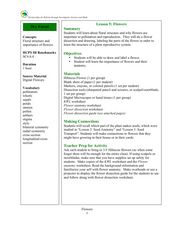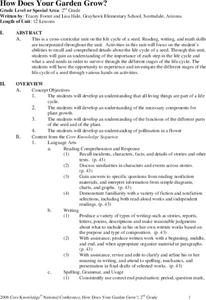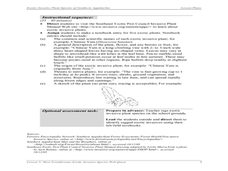Curated OER
Pollination and Fertilization
Save yourself time by using this concise arrangement of slides about pollination and fertilization in plants. Minimal wording is included, but the graphics are educational. You will also find charts for the adaptations of both...
The Science Spot
Flower Basics
Learn about plants and pollination with a worksheet about the parts of a flower. After labeling the anatomy of a flower using a word bank, kids explain the difference between self-pollination and cross-pollination, and unscramble...
Curated OER
Pollination
In this pollination worksheet, students read and assess comprehension. In this labeling and filling in the blanks worksheet, students answer fourteen questions.
Curated OER
Plant Reproduction Chapter #4
The only way to employ a plant reproduction presentation void of pictures is to support it with actual sample flowers. Botany beginners learn about plant reproduction through an underdeveloped outline of flower structures, reproductive...
Curated OER
Just Bee-Tween Flowers!
Students examine the major plant and bee parts and the interdependency between bees and fast plants. They observe and record the stages of growth of fast plants, take photos of the plant's life cycle, and cross-pollinate plants.
Curated OER
Genetics and the Work of Mendel
Excellent examples and clear diagrams in this PowerPoint will help you explain the genetics of alleles and the combinations of hybrid crosses. A high school class would appreciate having this student copy of the PowerPoint as the images...
K12 Reader
What’s Eating You?
Introduce your class to producers, consumers, and pollinators with a reading passage. Class members read the text and respond to five related questions.
Curated OER
Genetics and The Work of Mendel
If you need a summary of all aspects of Mendelian genetics then this slideshow is for you. The information included is essential for complete understanding of crosses, genotypes, phenotypes, and heredity.
Curated OER
Looking at Flowers
Pupils use their bee sticks to cross-pollinate their Fast Plants and also focus in on the anatomy of flowers. They analyze how the parts of a system go together, and how these parts depend on each other. Finally, students describe why...
Curated OER
Bees
Students design an experiment. In this bees lesson, students research pollination and work collaboratively to discover how bees aid in pollination. Students use tomato plants and create experimental designs. Lesson adaptations...
Curated OER
Mendel Pea Plants
In this Mendelian genetics worksheet, learners answer a variety of questions about Mendel's experiments and discoveries and they practice determining probability of outcomes in pea plants.
Curated OER
Getting a Handle on Your Bee
Middle schoolers observe dried bees, carefully glue them to toothpicks, and use them for cross pollinating their Brassica plants. They also describe reasons why two similar investigations can produce different results. Finally,...
Curated OER
The Birds and the Bees, and the Flowers and the Trees
Students examine the roles in which animals play in the pollination of plants. They recognize that flowers have male and female sexes. Students describe cross pollination and propose reasons for cross pollination through narration of a...
Curated OER
From Flower to Fruit
Learners examine how flowers have essentially four parts. They learn both the male and female reproductive parts of the flower, then explore self-pollination and pollination by insects and other animals.
Curated OER
Upper Grades Mapping Activity
Students build their school community into a better place. In this service learning instructional activity, students consider how to "cross-pollinate" the work of student organizations so that the school community experiences positive...
Curated OER
Mutualism and Co-evolution A study of Flowering Plants and their Pollinators: Biology, Plants
These lessons use a variety of methods and approaches to teach flowering plant biology which includes seed germination; plant growth and food production through photosynthesis; plant transpiration and respiration; sexual reproduction...
Curated OER
Genetics Practice 1: Basic Mendelian Genetics
Six genetics problems are to be solved by junior geneticists. Empty Punnett squares are provided for them to plant the parents' alleles and determine the genotype, phenotype, and frequency of offspring. All of the problems involve actual...
Curated OER
Observing Pods
Students observe the pistil growing into a tiny string bean-like seed pod. They then observe the development of the fertilized pods between Day 17 and Day 35 and record their observations by drawing and labeling, writing, and graphing. ...
Curated OER
Don't Wait, Just Propagate
Students explore the process of growing plants from seed. In this propagation activity, students examine methods of propagation and determine how to rapidly propagate plant species. Students listen to a lecture informing them on the...
Curated OER
Brays Bayou Spiderwort Genetic Study
Students formulate hypothesis based upon data gathered by examining possible crosses of spiderworts using Punnett squares. They present explanations for physiological adaptations of spiderworts that resulted from interactions within the...
Curated OER
Orchids and Evolution
Students study Charles Darwin's evolutionary theory and how he applied it to orchids. In this evolution lesson students repeat Darwin's orchid pollination experiment.
Curated OER
Dry Forest: Flowers
Learners explore botany by examining diagrams. In this plant reproduction lesson, students define a list of plant vocabulary terms and identify plant anatomy from a diagram. Learners complete several plant activity worksheets and study...
Curated OER
How Does Your Garden Grow?
Students complete activities to learn about the life cycle of a seed. In this plant growth lesson, students complete activities for the life cycles of seeds.
Curated OER
Most Troublesome Exotic Invasive Plant Species Web Quest
Learners participate in a Web Quest activity in which they identify common exotic invasive plant species of the Southern Appalachian Region. After identifying the top 10 exotic invasive species, they choose one to research in depth.

























